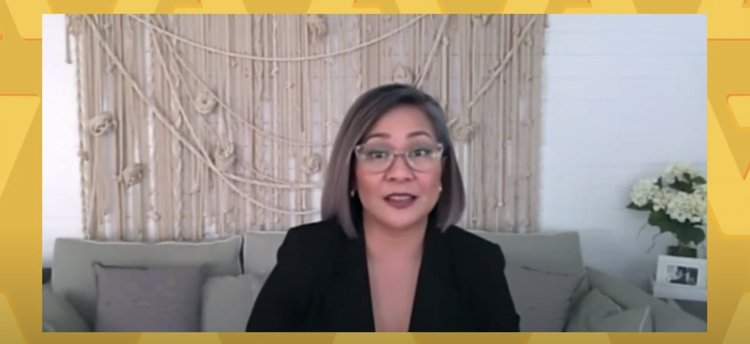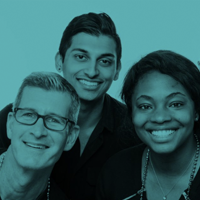There was a point when Katherine Hartley described her life as “absolutely perfect.” That began to fade, however, when she noticed that NJ, her young son, seemed to have trouble navigating his surroundings, and she suspected it wasn’t mere clumsiness.
NJ was eventually diagnosed with severe pathological myopia, a rare condition that can lead to total vision loss. After a string of treatments that only made the situation worse, doctors told Katherine there was nothing more they could do — but she knew there had to be a solution. In the story she shared during Adobe for All Week, Adobe’s annual internal D&I event, Katherine talked about the incredible journey she and her family took through the medical system to find a treatment that would restore NJ’s eyesight.
We talked to Katherine about her experience of sharing her story and why storytelling can give others hope.
Why did you feel it was important to share your story broadly with employees?
When I first saw employees present at the Adobe For All event, I thought it was so inspirational for people to share their stories and be vulnerable like that; storytelling allows us to be heard and potentially change people’s lives. And then I thought, “Hey, I have a story!” You can tell your story to one person or a small group and make a difference, but to be able to use your voice and reach that many people is amazing.
What was it like to share those experiences with such a large audience?
Well, first I tried not to think too much about the 17,000 people watching! I’ve worked alongside many inspirational leaders and speakers, and public speaking is a skill that I’ve always admired yet feared. Since this was a virtual event, it was a good opportunity to try public speaking without as much pressure.
Emotionally, telling my story was like reliving the whole experience. I’ve also written a book about the journey, so it was like going through those pages again — and when I thought about sharing it in such a large forum, I was petrified. But I told myself that it will help and inspire people. It was initially something to check off my bucket list, but it has been a fantastic experience.
What was the impetus for writing a book? Why did you title it Superhero Eyes?
After NJ’s surgery, I had all these folders of the research I had done. They just quietly sat in the corner for a long time. When I eventually went back and sifted through everything, I realized that this was the story of our journey as a family. I didn’t want that to be lost, so I just kept on working on putting it all together. It took almost 13 years.
The name came from NJ. When we were on our way to the clinic where he had his surgery, he said, “I’m going to get my superhero eyes.” That’s what he set out to do, and he did it.
What drove you to keep looking for the right diagnosis and treatment for NJ?
I’m a parent. Most doctors are great at what they do, but as a mother, you’re with your child 24/7. I was lucky enough to have that mother’s instinct. Something was just not right when the conventional treatments the doctors insisted was not improving NJ’s vision.
This was 20 years ago; Google, YouTube, and these tools we use today didn’t exist in their current form, so I couldn’t just type in a search, but I knew we weren’t getting the right answer.
Looking back, I think there were other kids in the clinic we visited who were diagnosed incorrectly. That’s another reason why I wanted to share my story, to raise awareness with parents who are in the same position – seeking-out the right treatment and support they need - and give them hope.
What kind of response did you receive from people who listened to your story?
It has been very moving. People told me about how much they relate, or how my story has given them hope in their own situation. That was the whole purpose of writing the book and sharing at Adobe For All Week. Storytelling makes us feel connected no matter our race, religion, or background, and this is also the story of a diverse group of people who collaborated to find this solution for a three-year-old child, a whole team of superheroes who came together.
NJ now works as a freelance videographer. How do you feel about that?
Yes, NJ is now 23. Both my sons (NJ and Austyn) work as freelance videographers, and I could not be more proud of them. When NJ graduated with his degree in film, I was overwhelmed with emotion that this is where he ended up, in an industry where vision is so important. Our whole journey, everything we pushed and worked for, has come full circle.
I look forward in seeing NJ share his work as he continues to follow his passion as a videographer.
And a huge milestone this year, as we celebrate 20 year since NJ’s surgery!




